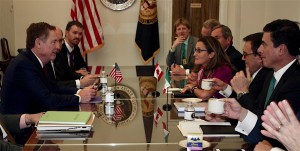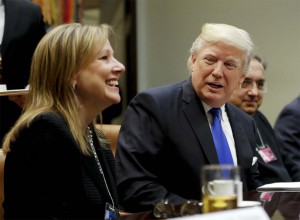Members of another White House advisory council resigned Friday, two days after President Donald Trump tweeted that he was “ending” a pair of economic advisory boards formed after his inauguration. In fact, the CEOs on those boards had voted to disband hours earlier in response to the controversy over the president’s comments about the rioting in Charlottesville, VA over the weekend.
“General Motors is about unity and inclusion and so am I,” GM Chairman and CEO Mary Barra said, in a statement. “Recent events, particularly those in Charlottesville, Virginia, and its aftermath, require that we come together as a country and reinforce values and ideals that unite us – tolerance, inclusion and diversity – and speak against those which divide us – racism, bigotry and any politics based on ethnicity.”
GM declined to comment when asked whether Barra would have joined the fast-growing list of executives who were quitting in response to the Trump’s comments on Charlottesville, but several company sources said the industry’s first female CEO was caught in a difficult position: needing to publicly express GM’s position on racism and the desire to maintain the close ear of the president. That’s especially significant considering the White House is addressing a wide range of issues that will have serious impact on the auto industry, including federal fuel economy standards and the North American Free Trade Agreement.
“I think there shouldn’t be a big problem (losing the seat on the council), but there could be some,” said David Cole, director-emeritus of the Center for Automotive Research in Ann Arbor, Michigan. “There’s the potential for a Trump effect in so many areas affecting the auto industry.”

U.S. Trade Representative Robert Lighthizer, left, talks with Canada's Chrystia Freelander and Mexico's Ildefonso Guajardo, both right.
(U.S. Trade chief says NAFTA “has failed” America. Click Here for the story.)
Arguably, the biggest issue is NAFTA. Perhaps no industry has made better use of the existing rules, automakers setting up a spider web of parts and assembly plants across the continent.
U.S. Trade Representative Robert Lighthizer has said that a key objective is to “ensure the rules of origin incentivize the sourcing of goods and materials (for the auto industry that means parts and fully assembled vehicles) from the United States of America.”
While any update to NAFTA will undoubtedly impact Canada, the big concern is Mexico which has grown from an industry backwater to one of the world’s largest automotive manufacturing powers. One reason is that it has negotiated a vast number of other free trade agreements, but Mexico also has extremely cheap labor, especially when compared to the U.S. So, industry observers warn, a revised NAFTA could force the industry to spend billions on new American plants, while also driving up new car prices at a time when vehicle sales are already starting to slide.
“Adding costs, even what might be considered small would have an impact on sales, and on jobs, something often lost on policy makers,” said Gloria Bergquist, vice president of the Alliance of Automobile Manufacturers, or AAM.
(Changes to NAFTA could mean big price hikes for U.S. motorists. Click Here for the story.)
The Administration is also considering another critical issue that, in this case, could save big money for the auto industry. Under the Obama Administration, the Corporate Average Fuel Economy standards, or CAFE, were set to rise to 54.5 miles per gallon by 2025. While the industry initially signed off on that target, plunging fuel prices and a sharp increase in light truck sales led 18 automotive CEOs to write the then newly inaugurated Pres. Trump asking him to re-open a “mid-term review” of the 2025 mandate.
The EPA, which administers the CAFE rules, earlier this month announced it would set up a new round of public comments, and it has signaled the agency may freeze the mileage rules at the lower target for 2021. Industry observers believe that would require fewer hybrids, plug-ins and battery-electric vehicles, reducing both R&D costs and any ultimate increase to consumers.
(Americans widely favor retaining strict new mileage standards. Click Here for more.)
There are other issues the administration may address that could impact not just GM but the auto industry as a whole:
- Any effort to simply or roll back regulatory requirements would likely be well received by automakers in Detroit, Asia and Europe;
- So would any move to communize international safety and vehicle design rules. Today, it can cost a manufacturers tens, even hundreds of millions of dollars to meet the different rules in Japan, Europe and the U.S.;
- Then there’s the emerging world of autonomous vehicles. Automakers would like to see standardized national, rather than state-by-state, rules for public testing. But they’d also like to receive more financial support, whether in tax breaks or the set-up of infrastructure systems needed to support tomorrow’s connected and self-driving vehicles.
It’s unclear how much GM CEO Barra was able to accomplish while she was sitting on the president’s council, and that makes it all the more difficult to determine just how much she, GM and the industry as a whole will lose as a result of yesterday’s announcement.
“There are still avenues of communications” to the EPA and other officials, as well as to the president himself, said AAM’s Bergquist. “I believe any one of our CEOs could call up the White House and he would accept that call.”
But virtually everyone who discussed the demise of the council said there were clearly advantages to being a part of Trump’s pet project and having such immediate access to the president’s ear.
(An earlier version of this story first appeared on NBCNews.com.)


